Skype: How the online chat revolution changed lives
- Published
- comments
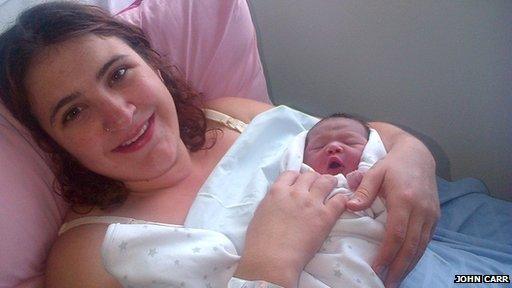
Ruby Carr's daughter Ivy took part in her first video call within minutes of her birth
It's been 10 years since Skype came on to the scene.
The internet chat service wasn't the first to allow people to make voice calls over the internet.
But by allowing the public to make computer-to-computer calls free and using peer-to-peer technology - which meant that connections improved the more people who used it - it helped popularise the concept.
Today Voip (voice over internet protocol) and video chats are something many of us take for granted. And Skype faces competition from a multitude of rivals, including Google Hangouts, Apple's Facetime, Blackberry's BBM, Tango and Viber.
But on this anniversary it's perhaps worth reflecting on the impact the technologies can have on people's lives.
Take the example of Lu Yang and Hamid Sirhan. When the London-based newlyweds decided to have a baby, Lu knew that her Chinese parents would not be able to come and visit them often.
As it turned out, her mother and father were not even able to make the journey when her daughter Yasmina was first brought home.
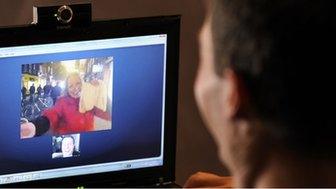
Skype did not offer video calls until just over two years after its launch
But video calls made it possible to introduce the baby to her grandma and grandpa in Beijing.
"We talk to them every single evening, and it is the only way for them to see their granddaughter grow," says Yang.
"They can't afford to come to London at the moment, and we can't afford to go there, either."
Yang adds that she has also used the technology for much more serious pursuits. Until recently, she worked for a London-based charity that helps persecuted freelance journalists worldwide.
"It's the only and unique way to get in touch with certain journalists from countries with repressive regimes, such as some former Soviet states," says Yang.
"They simply can get killed if they try to get in touch with us using the phone, to discuss the stories they are working on, which are usually stories about corruption and crime."
Robot doctors
The facility has also been a boon for doctors.
For example, Dr Maneesh Batra from Seattle Children's Hospital in the US routinely calls Kiwoko Hospital in rural Uganda to offer his expertise to local doctors.
He says that using video makes it easier to explain complicated procedures than trying to do so by email or voice alone.
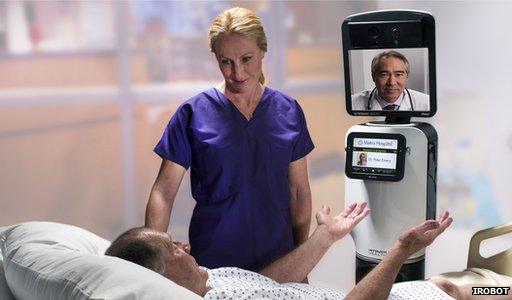
The RP-Vita robot incorporates video conferencing tech to help doctors visit patients
A team of researchers from the Massachusetts Institute of Technology in the US is trying to take this a step further with a spin-off company, iRobot.
They have developed a regulator-approved machine that glides through hospital corridors letting medics call in on patients based in other buildings. To let them do this the robot features a 15in (38cm) screen, microphone and built-in camera which connect to InTouch Health's video-conferencing system.
"There's an ageing population, especially in developed countries, there's a crisis around the cost of providing healthcare and we have robotics technology - so you put all of those things together and you come out with solutions," Jeff Beck, the firm's chief operating officer, tells the BBC.
Of course, older patients might feel a little less positive about the idea of their doctor "teleporting" into consultations via such machines.
Split-screen photos
Technology giant Microsoft bought Skype in 2011 for $8.5bn (£.5.5bn), and as you might expect, Microsoft's corporate vice-president for Skype, Mark Gillett, has his own favourite story about how the technology can "bridge people's lives together".
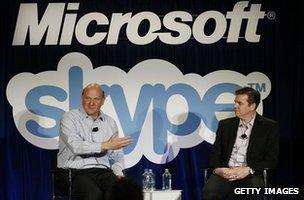
Microsoft bought Skype in 2011 and has added the tech to its Outlook email service
"About a year ago I saw a couple of portraits where people had hooked up their laptops to a projector and [used the software] to bring a family together," he tells the BBC.
"It was a split family in North Korea and China. They could never otherwise have been together. It was such a visual and graphic representation of the power of video to just dissolve geography."
But for all its benefits, there is also a dark side to the rise of video-conferencing tech.
Earlier this week an Australian military cadet was found guilty of using Skype to stream footage of himself having sex with a female colleague to a room of other students, without telling the victim of his plan.
The incident has prompted the government to order a review into wider allegations of sexism in the military.
There have also been numerous instances of people using such programs to persuade juveniles to strike suggestive poses and then using recordings of the footage to blackmail them into doing worse.
"The fact that people can use this type of software while making themselves difficult to trace means they that it can be abused, sometimes very badly indeed," warns John Carr, secretary of the UK's Children's Charities' Coalition on Internet Safety.
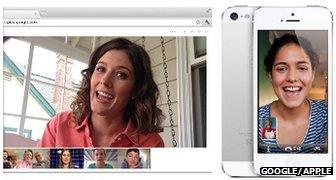
Google Hangouts and Apple's Facetime are two popular alternatives to Skype
"It's why parents need to talk to their children about being careful about who they agree to speak to."
However, he adds that on a personal level video-conferencing recently came "to the rescue" of his family.
His pregnant daughter's Cambodian partner had been refused access to the UK by the immigration authorities shortly before the birth, which the parents-to-be had wanted to happen in England.
As a result he was unable to be present on the big day - but a tablet computer helped him avoid being completely shut out of the event.
"The iPad was running Skype within a minute of Ivy arriving, while she was still attached to the umbilical cord and resting on her smiling but exhausted mother's chest," Mr Carr recalls.
"Some of the first sounds Ivy heard were of her dad speaking to her in Khmer. The battle-hardened midwives all blubbed."
- Published29 August 2013
- Published7 August 2013
- Published12 July 2013
- Published14 May 2013